Greetings, fruit enthusiasts! In this comprehensive guide, I will provide you with fresh insight into the world of fruit prices, helping you navigate the market to find the best deals and make informed choices for your health and your wallet. Whether you’re looking for affordable options, competitive prices, or even organic fruit, I’ve got you covered. Let’s dive in!
Key Takeaways:
- Fruit prices can greatly influence consumer choices.
- Understanding the factors affecting fruit prices, such as seasonality and competition, can help you find the best deals.
- Organic fruit prices are of interest to those seeking healthier and environmentally-friendly options.
- Pesticide residues on fruits can impact consumers’ preferences and health concerns.
- Consuming organic fruits can provide various health benefits.
Stay tuned as we explore these topics in detail, equipping you with the knowledge you need to make the most out of your fruit-buying experiences.
The Impact of Fruit Prices on Consumer Choices
When it comes to buying fruits, the price plays a significant role in consumers’ choices. Affordable fruit prices not only attract customers but also encourage them to buy more. Low fruit prices can make healthy eating more accessible to a wider range of people, promoting better nutrition and overall well-being.
Understanding the current fruit prices is crucial for both consumers and businesses in the fruit industry. As consumers, being aware of the prevailing fruit prices allows us to plan our grocery budget better and make informed decisions about which fruits to purchase. On the other hand, businesses in the fruit industry must stay updated with the market trends to ensure competitive pricing and meet the demands of their customers.
In a recent study, it was found that the affordability of fruit prices influenced consumer behavior significantly. When fruits were priced lower, consumers were more likely to buy larger quantities and experiment with different varieties. This highlights the importance of offering competitive fruit prices to not only attract customers but also foster a culture of healthy eating.
Organic fruits, in particular, tend to be higher in price due to the rigorous standards of organic farming and certification. However, as more consumers become health-conscious and environmentally aware, there is a growing demand for affordable organic fruit options. Businesses that can offer competitively priced organic fruits have a unique advantage in catering to this market segment.
In summary, fruit prices have a substantial impact on consumer choices, with affordability playing a crucial role in promoting healthy eating. By understanding the current fruit prices, both consumers and businesses can make informed decisions that align with their budget and preferences. Moreover, offering affordable organic fruit options can tap into the growing market demand for healthier and environmentally-friendly choices.
Factors Affecting Fruit Prices
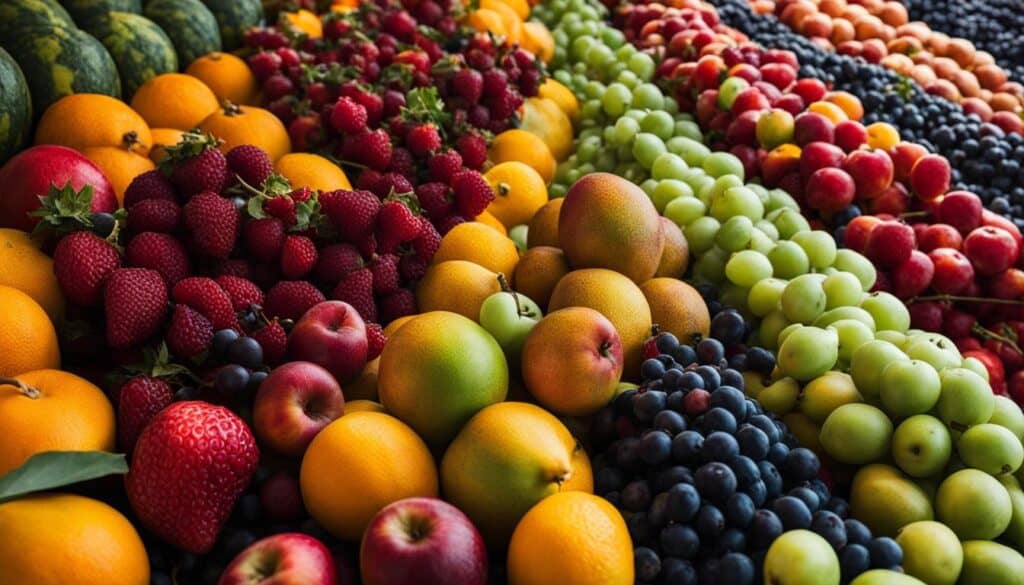
Fruit prices are influenced by several factors that impact their availability and market demand. Understanding these factors can help consumers make informed decisions and find the best fruit prices. The main factors affecting fruit prices include:
Seasonality
One significant factor affecting fruit prices is seasonality. Certain fruits are more abundant and cheaper during specific seasons when they are in peak production. For example, berries tend to be more affordable during the summer months when they are in season and readily available. On the other hand, fruits that are out of season or have a limited growing season may be more expensive due to lower supply.
Competition
Competition among fruit suppliers also plays a role in determining fruit prices. To attract customers and gain a competitive edge, suppliers may offer lower prices. This competition can drive down fruit prices, benefiting consumers who are looking for more affordable options. However, it’s important to note that competitive fruit prices may vary depending on the region and local market dynamics.
Transportation and Storage Costs
The costs associated with transporting and storing fruits can also impact their prices. Fruits that need to be transported over long distances or require specialized storage conditions may have higher prices due to the additional expenses involved. For example, exotic fruits that are imported from distant countries may be more expensive compared to locally grown fruits due to the higher logistics costs.
By considering these factors, consumers can be more informed about fruit prices and make choices that align with their preferences and budget. Additionally, it’s worth noting that prices may fluctuate based on market conditions, supply and demand dynamics, and other external factors.
The Importance of Organic Fruit Prices
When it comes to making healthy and environmentally-friendly choices, organic fruits are often a top priority for many consumers. The absence of synthetic pesticides and genetically modified organisms (GMOs) in organic fruits makes them a preferred option for those looking to prioritize their well-being. However, the affordability of organic fruits plays a crucial role in determining their accessibility to a wider audience.
Having affordable organic fruit prices allows more consumers to incorporate these healthier choices into their diets. It encourages individuals to opt for organic options, promoting a sustainable and chemical-free food system. By supporting competitive prices for organic fruits, we can ensure that more people can enjoy the benefits of organic produce without breaking the bank.
Table: Comparison of Organic Fruit Prices
| Fruit | Average Price (per pound) |
|---|---|
| Organic Apples | $3.99 |
| Organic Strawberries | $4.99 |
| Organic Bananas | $2.49 |
| Organic Oranges | $3.79 |
“Affordable and competitively priced organic fruit options can make these healthier choices more accessible to a wider audience.”
By offering affordable organic fruit prices, we not only benefit consumers but also support a sustainable and ethical farming industry. Organic farming practices prioritize soil health, biodiversity, and the reduction of synthetic inputs. By choosing organic fruits and supporting fair pricing for these products, we can contribute to a healthier planet and a more equitable food system.
The Impact of Pesticides on Fruit Prices
When it comes to purchasing fruits, the presence of pesticides can have a significant impact on consumers’ choices. Many people are now more conscious about the potential health risks associated with pesticide residues on their food, leading to an increased demand for organic fruits. This demand, in turn, has resulted in higher prices for organic options.
Consumers are willing to pay a premium for organic fruits due to concerns about pesticide residues. According to a study, over 70% of consumers are willing to pay up to 20% more for organic produce. This increased demand has pushed the prices of organic fruits higher, making them less affordable for some individuals.
However, it is important to note that organic fruits are not the only option for those looking to minimize pesticide exposure. The Environmental Working Group’s annual analysis provides a list of fruits with the highest and lowest pesticide residues. By referring to the “Dirty Dozen” list, consumers can prioritize purchasing organic for fruits with the highest pesticide residues, such as strawberries and apples. On the other hand, the “Clean Fifteen” list highlights fruits with the lowest pesticide residues, such as avocados and pineapples, offering more affordable options that are still relatively low in pesticide residues.
| Fruit | Organic Price | Conventional Price |
|---|---|---|
| Strawberries | $4.99 | $2.99 |
| Apples | $3.49 | $1.99 |
| Avocados | $2.99 | $1.49 |
| Pineapples | $2.99 | $1.99 |
As shown in the table above, organic strawberries and apples can be significantly more expensive compared to their conventionally grown counterparts. However, organic avocados and pineapples are only marginally more expensive or even similarly priced to their conventional counterparts. This price comparison highlights the importance of considering both the presence of pesticide residues and the price when making purchasing decisions.
In conclusion, the impact of pesticides on fruit prices is multifaceted. While organic fruits may come with a higher price tag due to the increased demand for pesticide-free options, consumers can still make choices that align with their budget and health concerns. By utilizing resources like the Environmental Working Group’s lists, individuals can make more informed decisions about which fruits to prioritize purchasing organic, ensuring they enjoy the benefits of organic fruit consumption without breaking the bank.
The Dirty Dozen: Fruits with the Highest Pesticide Residues
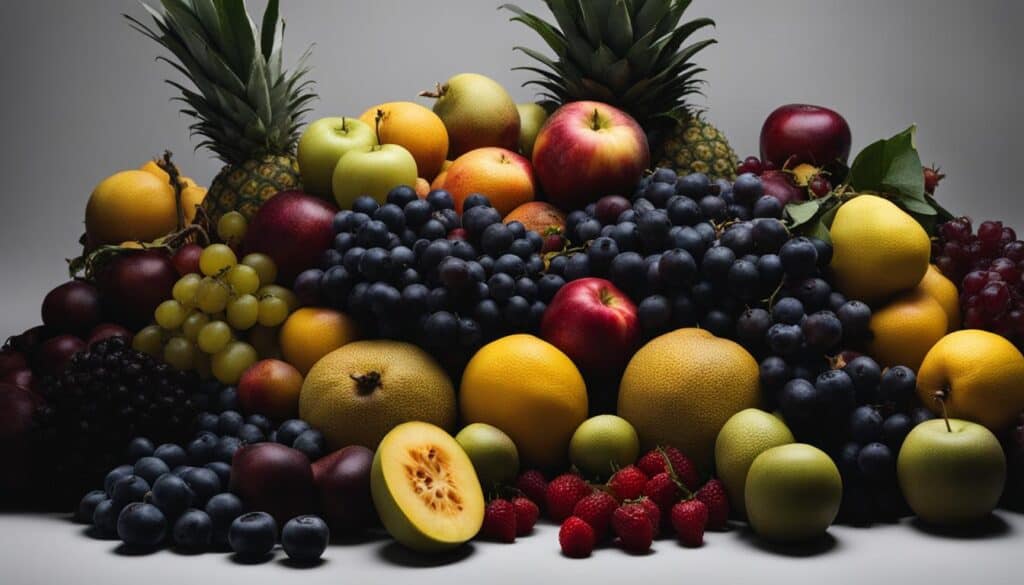
When it comes to choosing fruits, it’s essential to consider the potential pesticide residues they may contain. The Environmental Working Group’s annual analysis revealed that nearly 75 percent of non-organic fresh produce sold in the U.S. contains traces of potentially harmful pesticides. Among these fruits, the “Dirty Dozen” stands out with the highest levels of pesticide residues. These findings highlight the importance of being aware and making informed choices about which fruits to prioritize purchasing organic.
Strawberries, spinach, kale, peaches, apples, and grapes are among the fruits that consistently rank high on the Dirty Dozen list. Pesticides used in conventional farming practices can linger on the skin and seep into the flesh of these fruits, potentially exposing consumers to harmful chemicals. To minimize exposure to pesticide residues, individuals can opt for organic varieties of these fruits, reducing potential health risks.
Table:
| Fruit | Pesticide Residue Level |
|---|---|
| Strawberries | High |
| Spinach | High |
| Kale | High |
| Peaches | High |
| Apples | High |
| Grapes | High |
| … | … |
These findings emphasize the importance of considering both the environmental and health impacts when choosing fruits. Opting for organic fruits with lower pesticide residues can help reduce potential exposure to harmful chemicals, contributing to a healthier and safer diet.
In the next section, we will explore the “Clean Fifteen” – fruits that have been found to have lower pesticide residues. These fruits offer a budget-friendly option for individuals who are concerned about pesticide exposure but want to make healthier choices. Stay tuned to discover the fruits that make the list and learn more about reducing pesticide exposure while enjoying delicious and nutritious fruits!
The Clean Fifteen: Fruits with the Lowest Pesticide Residues
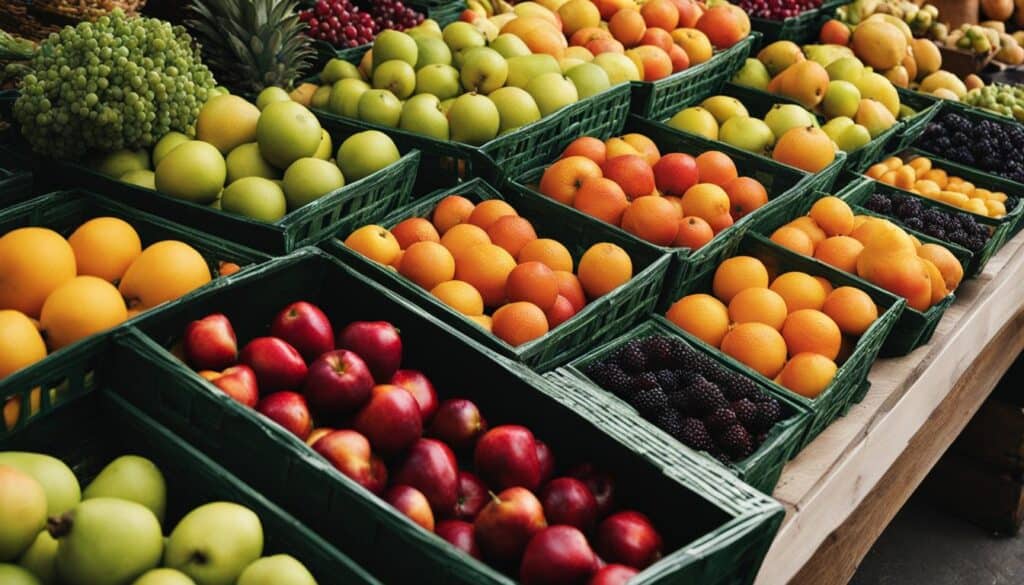
When it comes to choosing fruits with the lowest pesticide residues, the Clean Fifteen is a valuable guide. These fruits have been found to have minimal pesticide contamination, making them a safer choice for those concerned about pesticide exposure. By opting for these fruits, you can prioritize your health and well-being without breaking the bank.
“Consumers who want to reduce pesticide exposure but are on a budget can turn to the Clean Fifteen list to make informed purchasing decisions. These fruits have shown lower levels of pesticide residues, providing a healthier alternative at an affordable price.” – Organic Food Magazine
Among the Clean Fifteen, avocados are a standout option. Not only do they have lower pesticide residues, but they are also nutrient-dense and packed with healthy fats. Sweet corn is another excellent choice, as it not only boasts low pesticide levels but also offers essential vitamins and minerals.
Enjoying fruits with minimal pesticide residues doesn’t have to be expensive or difficult. By referring to the Clean Fifteen list, you can make informed choices that prioritize your health while keeping your budget in check.
| Fruit | Pesticide Residue Level |
|---|---|
| Avocados | Low |
| Sweet Corn | Low |
| Pineapples | Low |
| Onions | Low |
Key Takeaways:
- The Clean Fifteen offers a selection of fruits with minimal pesticide residues.
- Choosing fruits from this list can help reduce exposure to harmful pesticides.
- Avocados, sweet corn, pineapples, and onions are among the standout fruits with low pesticide levels.
- By referring to the Clean Fifteen, consumers can make informed decisions that prioritize their health and budgets.
The Impact of Pesticides on Health and Safety
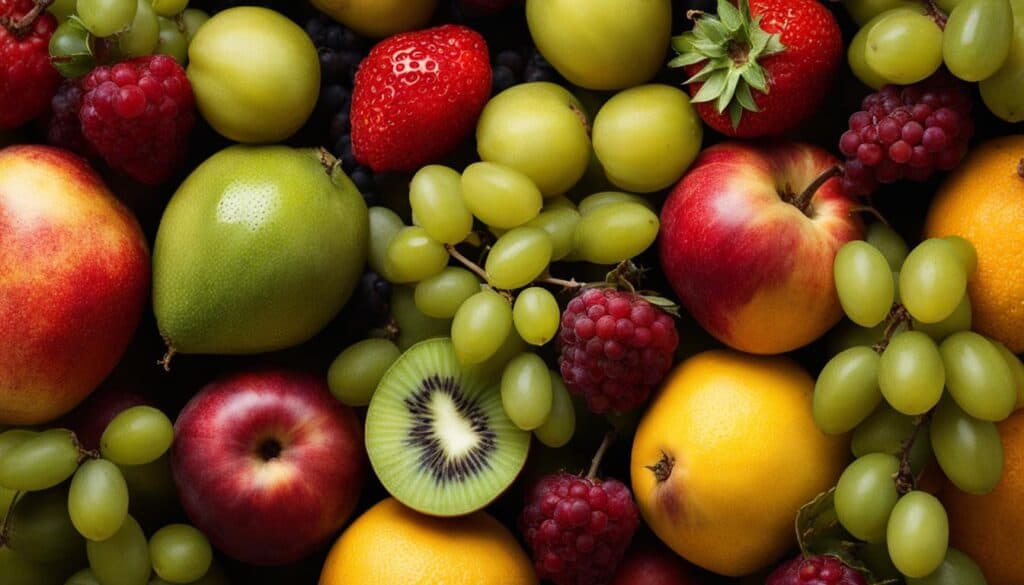
When it comes to purchasing fruits, considering the impact of pesticides on health and safety is crucial. Pesticides are chemicals used to protect crops from pests, but they can pose potential health risks to consumers. Research has shown that pesticide exposure can have negative effects on our well-being, especially for children. Studies have linked pesticide residues on fruits to cardiovascular disease, reduced fertility, and an increased risk of certain cancers.
Choosing organic fruits can help mitigate these health risks. Organic fruits are grown without the use of synthetic pesticides, making them a safer and healthier choice for consumers. By opting for organic fruit options, you can reduce your exposure to potentially harmful chemicals and promote a healthier lifestyle for yourself and your family.
It’s important to note that organic fruit prices may be slightly higher compared to conventionally grown fruits. However, the benefits of reduced pesticide exposure outweigh the cost difference for many consumers. By prioritizing your health and safety, you can make informed choices when it comes to purchasing fruits.
“Organic fruits offer a safer and healthier option for consumers, as they are grown without the use of synthetic pesticides.”
In conclusion, understanding the impact of pesticides on health and safety is essential when making fruit purchasing decisions. By opting for organic fruits with lower pesticide residues, you can reduce your exposure to potential health risks and prioritize your well-being. While organic fruit prices may be slightly higher, the long-term benefits of a healthier lifestyle outweigh the cost difference. Choose organic fruits for a safer and more nutritious option for you and your loved ones.
| Fruit | Pesticide Residues |
|---|---|
| Strawberries | High |
| Spinach | High |
| Kale | High |
| Peaches | High |
| Apples | High |
| Grapes | High |
The Benefits of Organic Fruit Consumption

When it comes to making healthy choices, organic fruits can provide numerous benefits for your overall well-being. Consuming organic fruits has been associated with various health advantages, including improved fertility, reduced incidence of non-Hodgkin lymphoma, and a lower risk of type 2 diabetes. By opting for organic options, you can prioritize your health and make a positive impact on the environment.
One key advantage of organic fruit consumption is the absence of synthetic pesticides. Conventional fruits often contain residues of potentially harmful pesticides, which can pose health risks, especially to children. By choosing organic fruits, you can reduce your exposure to these potentially harmful substances and protect yourself and your family.
Moreover, organic fruits are grown using sustainable farming practices that promote biodiversity and protect natural resources. Organic farming methods prioritize soil health and rely on natural fertilizers and pest control methods. This supports a healthier ecosystem, reduces water pollution, and helps to maintain the balance of our delicate environment.
Ultimately, organic fruit consumption allows you to enjoy the natural flavors and nutritional benefits of fruits without the concerns of synthetic pesticides. By making this choice, you are supporting sustainable agriculture practices and prioritizing your health. So, next time you shop for fruits, consider going organic and savor the delicious taste of nature’s finest offerings.
Table: Health Benefits of Organic Fruit Consumption
| Health Benefit | Description |
|---|---|
| Improved Fertility | Studies have shown a positive association between organic fruit consumption and improved fertility rates, benefiting couples trying to conceive. |
| Reduced Incidence of Non-Hodgkin Lymphoma | Organic fruit consumption has been linked to a lower risk of non-Hodgkin lymphoma, a type of cancer affecting the lymphatic system. |
| Lower Risk of Type 2 Diabetes | Choosing organic fruits may help reduce the risk of developing type 2 diabetes due to their higher nutrient content and lower pesticide exposure. |
Note: Organic fruit consumption should be part of a balanced diet and healthy lifestyle. It is always recommended to consult with a healthcare professional or nutritionist for personalized dietary advice.
Conclusion
As I wrap up this guide to fruit prices, I want to emphasize the importance of staying informed as a consumer. By understanding the current fruit prices, you can make savvy purchasing decisions that align with your budget and health goals. Whether you’re looking for affordable fruit prices, the best deals, or competitive options, being aware of the market trends is key.
Seasonal fruit prices play a significant role in determining the cost of your favorite fruits. Take advantage of the abundance and lower prices of fruits during their peak seasons. Additionally, if you’re passionate about organic fruit consumption, keep an eye on organic fruit prices. Affordable organic options ensure you can prioritize your health and the environment without breaking the bank.
Lastly, the presence of pesticides on fruits is a concern for many consumers. By choosing organic fruit options with lower pesticide residues, you can reduce potential health risks. Organic fruits not only offer health benefits but also provide peace of mind, knowing that you’re making a safer choice for yourself and your loved ones.
Remember, being informed about fruit prices and understanding the impact of pesticides can empower you as a consumer. So next time you’re shopping for fruits, consider the prices, prioritize your health, and make choices that align with your values.
FAQ
What factors can affect fruit prices?
Fruit prices can be influenced by factors such as seasonality and competition among fruit suppliers.
Why are organic fruit prices important?
Organic fruit prices matter to those seeking healthier and environmentally-friendly options.
How do pesticides impact fruit prices?
Pesticide residues can affect consumer preferences and buying decisions, leading to changes in fruit prices.
Which fruits have the highest pesticide residues?
Strawberries, spinach, kale, peaches, apples, and grapes are among the fruits with the highest pesticide residues.
Which fruits have the lowest pesticide residues?
Avocados, sweet corn, pineapples, and onions are among the fruits with the lowest pesticide residues.
What are the health risks associated with pesticide exposure?
Pesticide exposure has been linked to cardiovascular disease, reduced fertility, and increased risk of certain cancers.
What are the benefits of consuming organic fruits?
Organic fruit consumption has been linked to improved fertility, reduced incidence of non-Hodgkin lymphoma, and lower risk of type 2 diabetes.

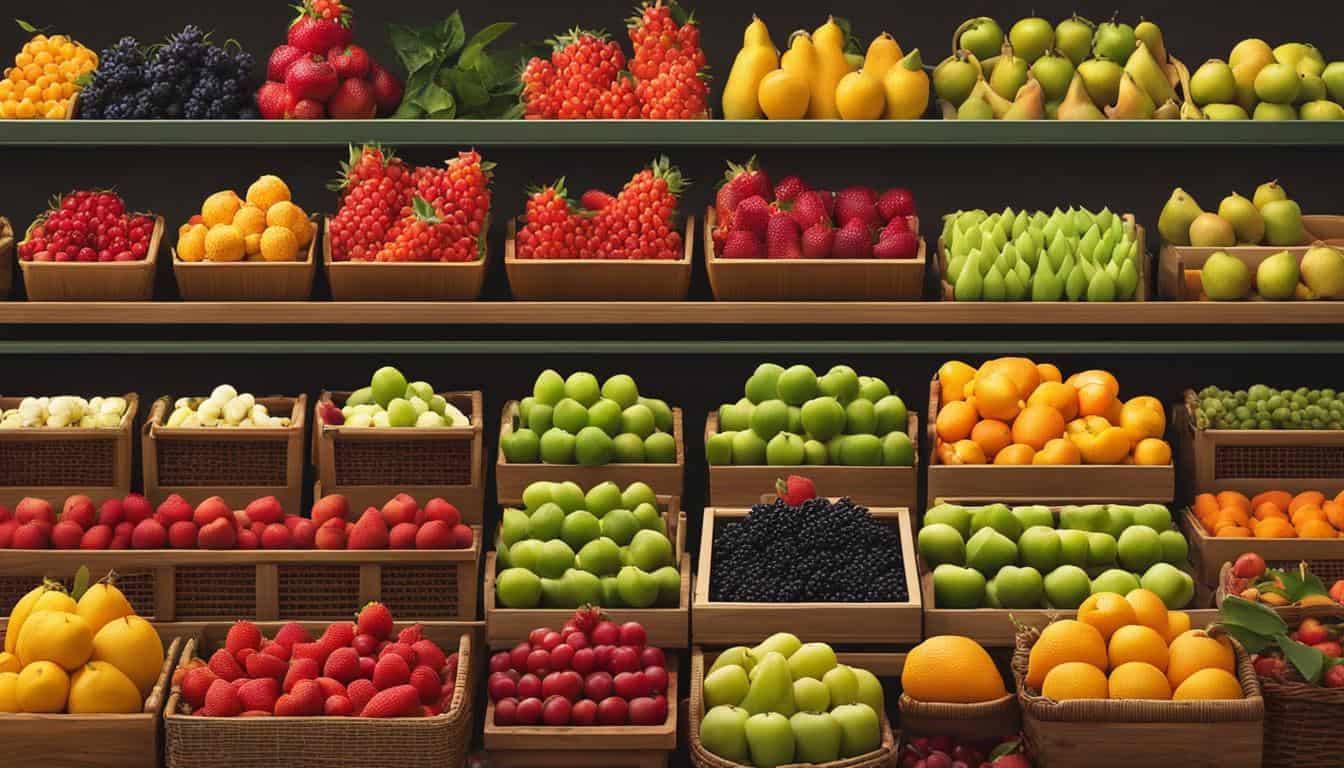



Leave a Reply